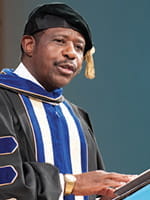Paul Rusesabagina shares what the Rwandan genocide taught him and how anyone can effect positive social change for an entire community.

Paul Rusesabagina.
Photo credit:
Lee Prohofsky.
When the Rwandan genocide began in April 1994, Paul Rusesabagina, then the manager of the Hotel des Mille Collines in Kigali, found himself at home with his wife, four children—and 26 neighbors seeking asylum from the horror in their neighborhood. The brief calm would be broken when a Hutu army captain knocked on his door.
“We saw soldiers climbing the gate [in front of my home],” he explains. “There was no other choice than to meet.” When Rusesabagina opened his door, the captain told him the president was dead and a new government had been set up. The captain, who knew he managed the hotel, ordered him to take his soldiers there.
En route, their Jeeps—replete with soldiers and Rusesabagina’s family and neighbors—came to a full stop. The captain told him, “You are lucky. We are not killing you today, but all of these cockroaches of yours are enemies of the country.” Rusesabagina was handed a gun and ordered to kill them.
Consider for a moment, if you were placed in this situation, what you might do. How would you defend your family and neighbors?
When faced with this choice, Rusesabagina relied on the power of words. He negotiated with the captain—literally ransoming the lives of his family and neighbors. “If you see so many bodies all along the street, what do you say? Who are you not to be killed? After a few minutes I told him I do not know how to use guns.” At that point, the negotiations started.
Rusesabagina pointed to his neighbors, asking, “Are you sure these are the enemies we are fighting today? I don’t blame you, but I don’t understand you. You are hungry, thirsty, tired. You are stressed by the war. But we can find solutions.” Ultimately, the captain spared all of their lives and led everyone to the hotel.
In the harrowing days that followed, Rusesabagina became a vital mediator—not only saving his family and neighbors, but ultimately more than 1,200 people who found their way to the hotel in the months that followed.
Here, Walden’s summer 2013 commencement speaker, who wrote the autobiography An Ordinary Man and is portrayed by Don Cheadle in the film Hotel Rwanda, shares what the genocide taught him and how anyone can effect positive social change for an entire community:
“These experiences were the scariest moments of my life but at the same time taught me one of the most important lessons: how to deal with evil.”
“I believe in the power of words. I believe that by standing up, talking about what is going on, and being the voice for the voiceless, we raise awareness—and by raising awareness we can change the world. Words can be the most powerful weapons. Your words can make people survive.”
“We can never change the world unless we raise awareness and talk about what is going on and keep repeating it again and again and again.”
“We have to look at each other in our eyes and then come up with a compromise through dialogue. Shape the world the way you want it to be."



